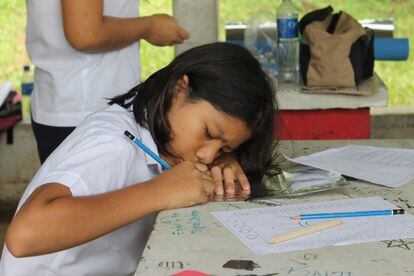Full Time School in El Salvador. World Bank
What would change in the way students are currently taught?
The primary school teacher does not think twice and launches a forceful response, but at the same time respectful -both for his students and for his colleagues in Latin America.
"We really have to ask ourselves if our educational practices are being useful to our students, and if we are educating for the society in which each one of them will be an active protagonist," says Darío Greni, a teacher at Rural School No. 88 in Uruguay and finalist of the Global Teacher Prize of the Varkey Foundation.
Already in 2019, before the pandemic, there was a deep learning crisis: 53% of children who finished primary school in Latin America and the Caribbean could not read or understand a simple text.
Today, after the closure of schools for the equivalent of almost two academic years, that percentage is estimated to have risen to 64% across the region.
These data confirm a reality in Latin American schools: most children go to classes, but the quality problems are such that they do not have the fundamental skills, according to Jaime Saavedra, global director of education for the World Bank.
And he adds that while reading is not the only important skill, if children fail to achieve basic skills it is very difficult to achieve other educational goals.
Educational quality before and after the pandemic
Classrooms in Latin America and the Caribbean were closed at the beginning of the pandemic in a complex context.
Being the closure a policy decision without solid foundations on the consequences that it could have, almost two years later it has been seen that the public health benefits will not justify the very high cost that students will pay, according to an analysis carried out by the World Bank .
The region has had the second longest lockdown in the world.
Although laudable remote learning efforts were made far and wide, given the low connectivity rates in Latin America, the importance of the student-teacher relationship, and the diversity of contexts, the effectiveness of remote learning, both in the region as in the rest of the world, it has been quite low and heterogeneous during the pandemic, according to Saavedra.
Aside from the undermining of learning, there are other important impacts that will affect the recovery of students post-pandemic.
It is estimated, for example, that an additional 24 million students will drop out of the school system globally.
Similarly, those who currently attend school will see a 12% reduction in their annual income over their lifetime, which is equivalent to $2.3 trillion dollars in added economic costs in Latin America.
It is also worrying that lower educational rates lead to less participation in political and social institutions as well as greater crime and violence.
But the biggest catastrophe, without a doubt, is inequality, especially in a region like Latin America which, according to some indicators, is the most unequal in the world.
The pandemic increased educational inequalities drastically.
If students simply return to schools that are not adapted to their post-pandemic needs, the gaps will continue to widen.
It is this discouraging context that leads Saavedra to affirm, without suspicion, that Latin America and the Caribbean is going through the worst educational crisis of the last 100 years.
Accelerate quality learning to make up for lost time
“One of the first things we have to change is to make sure that all students receive a quality and equitable education,” says Keishia Thorpe, also a teacher, but in Maryland, United States, and winner of the Global Teacher Prize 2021.
This can become a reality if special attention is paid to spending on education at the regional level, which has been on a downward trend in the last 10 years.
It is urgent to invest more and better through public purchases, reduction of corruption, establishment of educational budgets based on results, increase in meritocracy, among others.
To recover and accelerate learning, certain activities must be taken into account in the future:
Re-enroll and retain everyone in school through vaccinations, safe reopening, re-enrollment drives, and identification of at-risk students.
Analyze learning levels using national, subnational, and classroom assessments, as well as strategies informed by assessment results.
Prioritize foundational competencies (alphanumeric and socioemotional skills) to close knowledge gaps.
Implement leveling and recovery programs, that is, be guided not only by what the curriculum says but by what students and teachers need to meet learning goals.
Develop the health and psychosocial and emotional well-being of teachers to strengthen their resilience and that of the student body.
Despite the difference in the contexts in which Thorpe and Greni students go to school, both teachers agree on the importance of socio-emotional learning, especially after the pandemic.
She indicates that, despite popular belief, the quality of education is not only focused on a good curriculum, but also on the training of teachers, on the integration of culturally relevant practices and socio-emotional learning.
"The topic of emotions has now reached our schools more than ever and it is something fundamental that we have to work on with children, but also with teachers," concludes Greni.
Cecilia Martínez Gómez
is a communications consultant for the World Bank.

